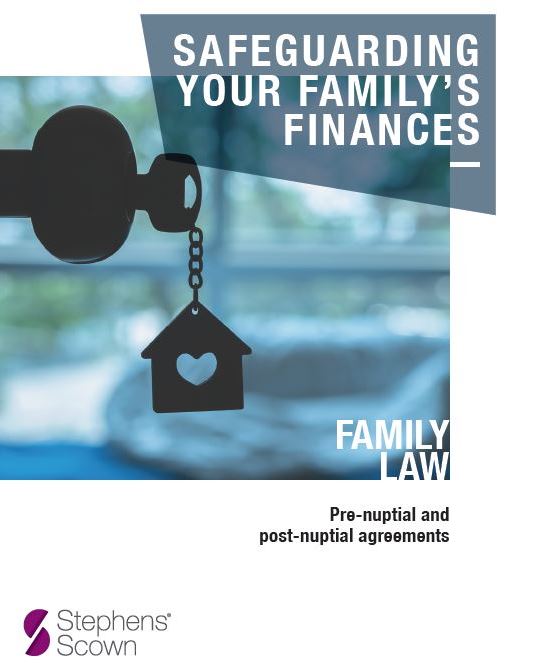Maintenance Agreements
Within the context of divorce, spousal maintenance orders are one of the options available to the court when considering a financial settlement. Spousal maintenance is separate to child maintenance, which is generally governed by the Child Maintenance Service. They are orders made to ensure the financially weaker party’s income needs will be adequately met.
What are maintenance agreements?
There are various types of maintenance orders available that may be agreed upon or ordered by the court. These are as follows:
- Child maintenance: Child maintenance may be at an agreed level between parties, but is more commonly paid at a prescribed rate, determined by the Child Maintenance Service. Unless the paying party’s income exceeds £156,000 or under other limited circumstances, generally the Child Maintenance Service will have jurisdiction for any such claims.
- Interim spousal maintenance: Interim spousal maintenance is the provision of financial support by one party to the other whilst financial remedy proceedings are yet to be resolved. Interim spousal maintenance can be achieved either by agreement, or if an agreement cannot be reached between the parties, an application to the court may become necessary.
- Spousal maintenance: Spousal maintenance is where one party pays the other party on a monthly basis, when the financially weaker party is unable to meet their income needs from the financial resource available to them. The order will stipulate the rate and duration of the payments, as well as the trigger events that may bring the maintenance order to an end.
- Global maintenance: Global maintenance consolidates spousal and child maintenance and under some circumstances may be considered more appropriate for the parties when separating, rather than having two separate forms of maintenance in existence concurrently.
- Capitalised spousal maintenance: Capitalised spousal maintenance is where there is a legitimate claim for a spousal maintenance order, but the parties agree or the court decides that, rather than maintenance being paid on an ongoing basis, it is ‘capitalised’. This provides a fund, often referred to as a ‘Duxbury fund’, for the financially weaker party to ensure their income needs can be met by utilising the fund they have received, whilst also making a clean break feasable and avoiding the possibility of a variation claim.

Variation of spousal maintenance
A maintenance agreement is somewhat different to many other orders that can be made by the court, such as transfer of property or a lump sum order, in the sense that maintenance orders are not entirely set in stone and can potentially be varied whilst the maintenance order remains in place. Variation of maintenance can be achieved by simple agreement between the parties. If that is not possible, an application to the court may become necessary.
Circumstances where one party needs to vary spousal maintenance may include the paying party no longer being able to afford the payments due to a loss of job or health issues, or conversely, the receiving party may need to increase the duration or value of the existing payments as they have not yet been able to transition to independence, perhaps due to unforeseen circumstances.
Formal variation applications of maintenance involve a court process, similar to the initial divorce settlement. This means that costs can outweigh the amount in dispute, making it important to seek legal advice from an experienced lawyer at an early stage.
If the paying or receiving parties’ circumstances have changed significantly since the original order, the court can change the maintenance provision by:
- Ending it altogether, if the recipient no longer needs it.
- Reducing the amount paid, if they need less than before.
- Increasing the amount paid, if they need more or if the paying party has become significantly better off.
- Changing the term over which the maintenance is paid, according to when the recipient can reasonably be expected to be financially independent.
- Order payment of a lump sum to capitalise maintenance or a share of the payer’s pension scheme in place of the maintenance, to achieve a clean break.
Our maintenance agreement experience
Seeking advice from a specialist family solicitor with the appropriate experience will swiftly clarify whether variation applications may be an avenue to pursue. Taking early advice can help avoid incurring unnecessary legal fees. Considering the general rule in such applications is that the losing party could end up paying some or all of the other party’s costs, there is a significant risk in pursuing litigation, particularly if you have not been properly advised.
Our Family Law team are specialists in the complex issues that can arise in these situations, and can advise you on the options available to you to help you achieve the best possible outcome in your case.

How can we help you
"*" indicates required fields
By pressing send and providing your details you are agreeing to our Privacy Notice.
Once you submit your enquiry we will forward to the correct legal team to get in touch as soon as possible.
Related Services
- Inherited and Pre-Marital Assets
- Pensions in Divorce
- Claims Against Trusts
- Interim Maintenance
- Financial Provision for Children
Downloads
Team Leader







